By 2030, AI could automate over 30% of global work hours, according to a 2024 McKinsey report. It's no surprise people are nervous about their careers. But you can turn this shift into an opportunity, if you prepare strategically.
The same report shows that demand for workers in STEM and other high-skill jobs is actually on the rise. The US Bureau of Labor Statistics backs this up too—they're predicting a 32% jump in data science jobs and 26% more computer and information research scientists by 2032. These are some of the fastest growing jobs!
So, what's the best way to avoid getting automated out of work? Simple: join one of these booming careers.
This article is here to bring you insights into the 2025 AI engineer job outlook.
For the past few years, we've been researching various data-related job markets—covering everyone from data analysts to ML engineers.
This year, in response to the demand for AI skills, we've added AI engineers to our research mix. We've analyzed 1,000 job postings to show you exactly what employers want from AI engineers in 2025—so you can stay ahead of the game.
Key Insights
- Python Dominates: 71% of job postings require Python expertise, with Java (22%) maintaining its strength in enterprise AI development—notably higher than in other data-related roles.
- Data Skills Are Essential: SQL expertise (17.1%) is required for efficient data management and querying capabilities.
- Cloud Platform Dominance: AWS (32.9%) and Azure (26%) lead the cloud AI market, with cloud deployment skills becoming as crucial as machine learning knowledge.
- Natural Language Processing Focus: Despite the LLM revolution, traditional NLP skills (19.7%) remain in high demand.
- Education Requirements Shifting: PhD (27.7%) are not mandatory for careers in AI, with 48.6% of positions accepting Master's or Bachelor's degrees—emphasizing practical experience.
- Limited Entry-Level Opportunities: Only 2.5% of positions target junior professionals with 0-2 years of experience, suggesting the importance of gaining relevant experience through internships or related roles.
Table of Contents
- Methodology
- What do AI Engineers Do?
- How Can You Become an AI Engineer? (Education)
- What Technical Skills Do You Need as a Data Scientist? (Skills & Tools)
- How Can You Land an AI Engineer Job? (Locations & Salaries)
- What Is the AI Engineer Job Outlook for 2025?
- Become an AI Engineer with 365 Data Science
- FAQs
Methodology
We analyzed 903 job postings from Glassdoor US to help you get a better understanding of the AI engineer job market in 2025.
After cleaning and removing duplicates, we extracted key AI engineering keywords and requirements from each listing. This comprehensive analysis reveals current job responsibilities, skill requirements, and industry trends.
To make our findings clear and comparable, we've presented all data as percentages and created visual representations that highlight the most important trends.
What do AI Engineers Do?
Throughout our years of job market research, we've observed a trend in data and AI-related jobs. Companies are shifting away from hiring specialists who focus on single data tasks, increasingly preferring professionals who can manage data end-to-end and combine multiple skill sets.
To quantify this shift, we've developed our Job Posting Specialization Score (JPSS). But before we get into that, let's look at the accepted AI engineer job description.
AI Engineer Job Description
AI engineers design, build, and maintain artificial intelligence systems. They bridge theoretical machine learning concepts and practical AI applications, creating solutions that can understand, learn, and make decisions.
In 2025, AI engineers play a key role in companies that use artificial intelligence. They work hand-in-hand with data scientists, developers, and business teams to build and roll out AI tools that tackle real business challenges.
This AI career typically requires:
- Understanding of machine learning algorithms and frameworks
- Strong programming skills in Python and other relevant languages
- Experience with cloud platforms (AWS, Azure, GCP)
- Knowledge of data structures and algorithms
- Proficiency in deep learning frameworks (TensorFlow, PyTorch)
While data scientists focus on analyzing data and creating models, AI engineers transform these models into practical, production-ready AI applications.
Job Posting Specialization Score (JPSS)
This description holds true for specialized AI engineer roles—but does this reflect the actual state of the AI engineer job market? That’s where the JPSS comes in!
Our Job Posting Specialization Score (JPSS) analyzes job listings to determine whether companies prefer specialists with deep expertise in specific areas or generalists who can handle diverse tasks. This score helps reveal current hiring trends in the AI engineer job market.
Our analysis examined job postings across 11 different skill categories. We assigned each posting a Job Posting Specialization Score (JPSS) based on the number of required skill categories, helping us understand what employers are looking for in 2025. We categorized the groups as follows:
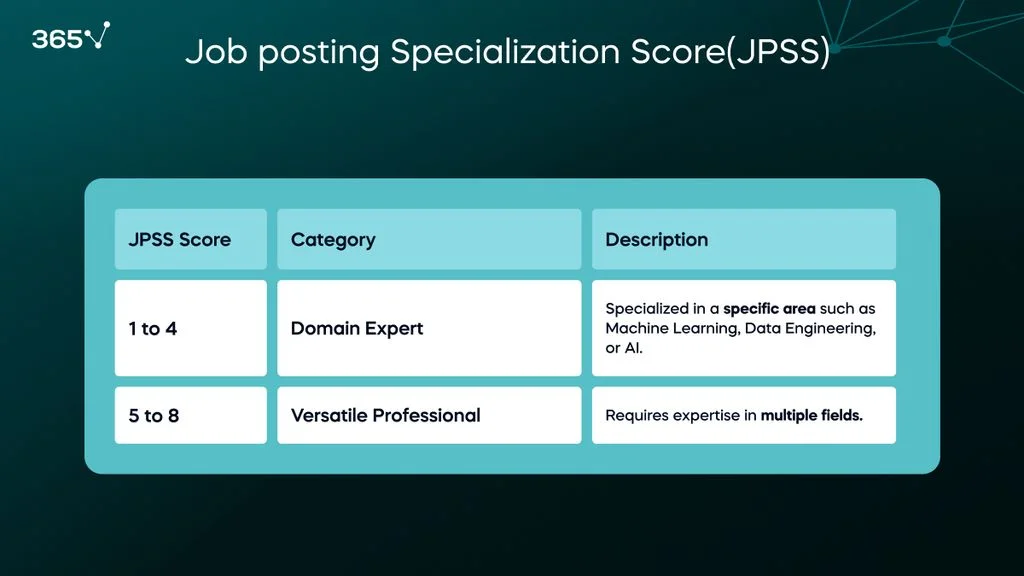
Here are the results:
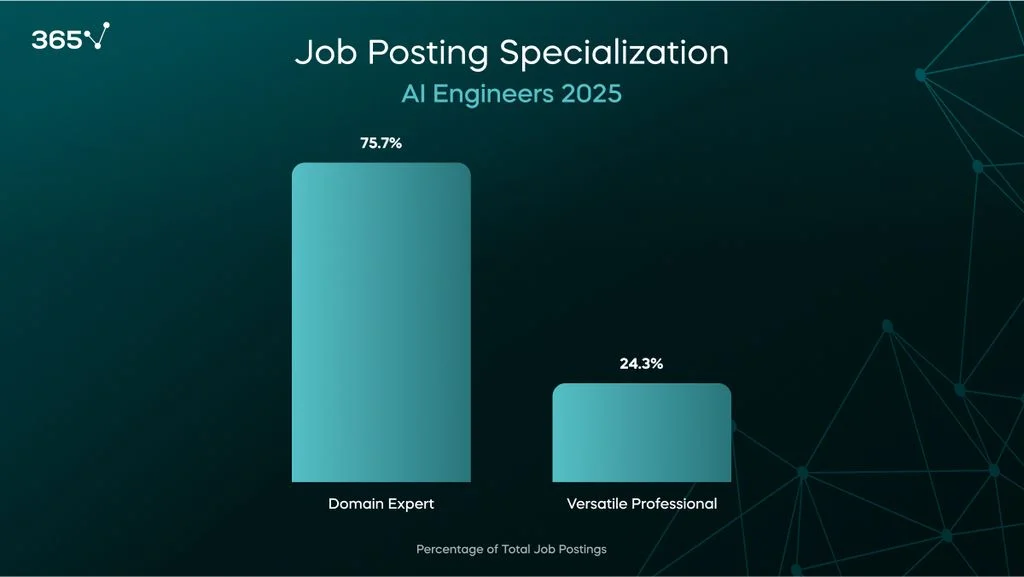
In contrast to other data roles—like data scientists (see our 2025 research)—which value versatility, the AI engineering field heavily favors specialists. Our research shows that over 75% of job listings specifically seek domain experts—those with deep, focused knowledge in AI engineering—over than broader skill sets. That’s three in every four job postings.
Unlike data analysts who primarily focus on core data skills with just basic knowledge of advanced topics like machine learning, AI engineers face a different challenge.
For an AI career path, while you must have a solid foundation in basic data skills, your domain expertise comes into play with more complex topics. AI engineers need to be hands-on practitioners rather than theoretical experts—so make sure you master those AI applications and build a solid portfolio.
For comprehensive training aligned with current market demands, consider the AI Engineer Career Track from 365 Data Science. It offers hands-on training in Python, LLMs, NLP, and practical AI development through building real-world applications like chat systems and vector databases.
Still, almost a quarter of jobs are seeking professionals who can wear multiple hats and handle different aspects of AI work. If you're interested in these positions, take some time to study the job listings you're targeting and build up the exact mix of skills those companies want. Getting certifications in those areas is a great way to make your resume stand out.
How Can You Become an AI Engineer?
Wondering how to become an AI engineer in today’s job market? Let’s look at what education and qualifications are employers looking for in 2025.
AI Engineer Education Requirements
Examining the AI engineer education requirements in 2025, our research shows that companies look for a mix when it comes to academic background and hands-on skills.
That being said, in such a highly technical field, having a degree is essentially mandatory for artificial intelligence careers.
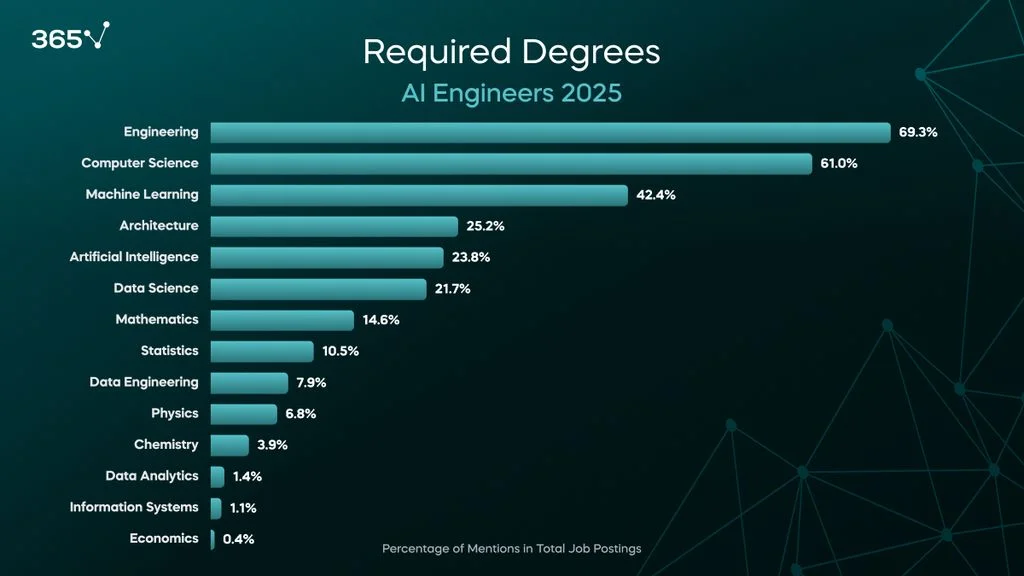
Our research shows that you don't need a specialized AI degree to land this role. Artificial intelligence degrees were only mentioned in about 24% of postings.
Engineering was the most popular degree for this role, appearing in nearly 70% of AI engineer job postings. Computer science followed closely behind at 61%.
This strong preference for technical degrees highlights the role's focus on practical engineering and development skills rather than purely theoretical AI knowledge.
Other frequently mentioned degrees include: machine learning (42%), data science (22%), and mathematics (15%).
Another interesting finding was the high rate of architecture degrees mentioned in job listings. We've found throughout our research that architecture appears in most data-related roles—but never at this high of a rate. Over a quarter of the job postings mention this field, likely due to its highly analytical and practical nature.
Now that you know what field you should focus on, let's examine what education level companies are looking for in AI engineer positions in 2025.
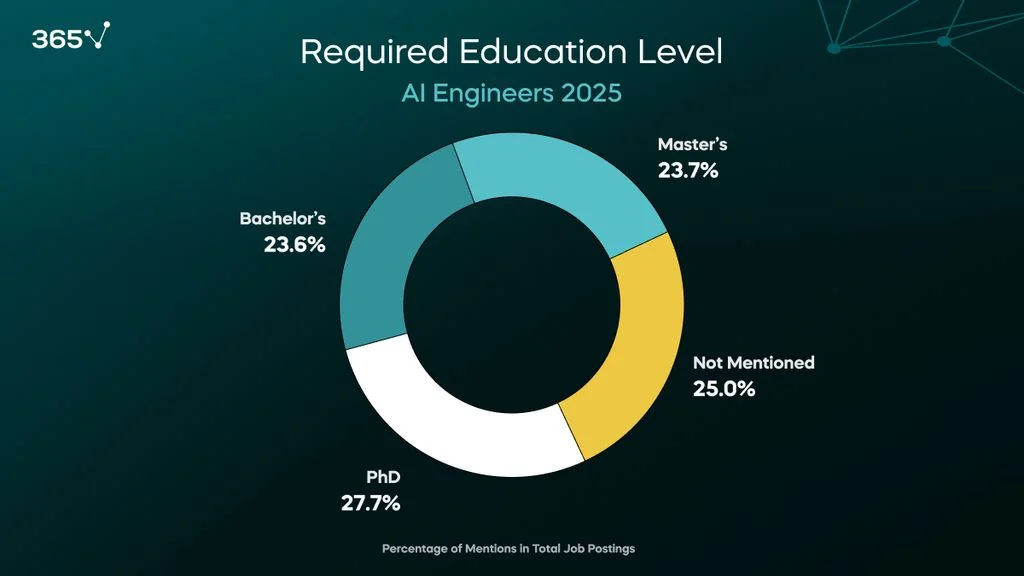
During the 80s and 90s, careers in AI were almost exclusively academic. You'd typically need a PhD to contribute meaningfully to the field, and your work might revolve around publishing papers rather than shipping products. AI was “pure research”.
Fast forward to 2025: AI is no longer just an academic discipline; it’s a mainstream corporate function. The title AI Engineer is a distinct, in-demand role alongside more traditional software engineering jobs.
As of 2025, there are more than 500,000 open roles globally for AI and ML engineers, with the largest concentrations in the US, India, and Western Europe.
What does this mean for you? The education requirements for AI engineers are shifting—moving away from traditional academic PhDs and becoming more accepting of master's and even bachelor's degrees.
Our data supports this trend: there is an almost even split among degree levels mentioned in AI engineer job postings. While PhDs remain the most frequently mentioned requirement at 28% of postings, master's and bachelor's degrees appear equally often, each mentioned in about 24% of listings.
If you don't have an advanced degree, don't worry—a quarter of the job postings have no specific degree requirement. This indicates that, if you can prove your skills and showcase a strong portfolio of work, you'll still have plenty of opportunities in this field.
You can enhance your bachelor's degree with targeted certifications from our learning platform 365 Data Science—we offer all the topics you need to secure a job this year!
What Technical Skills Do You Need as a Data Scientist?
Beyond academic credentials, employers prioritize value skills and experience—especially if you can demonstrate your capabilities through real-world projects. Here are the AI engineer skills hiring managers seek in 2025.
Programming Skills for AI Engineering
Programming is the core skill behind AI engineering, used to build tools, automate tasks, and solve complex problems with data.
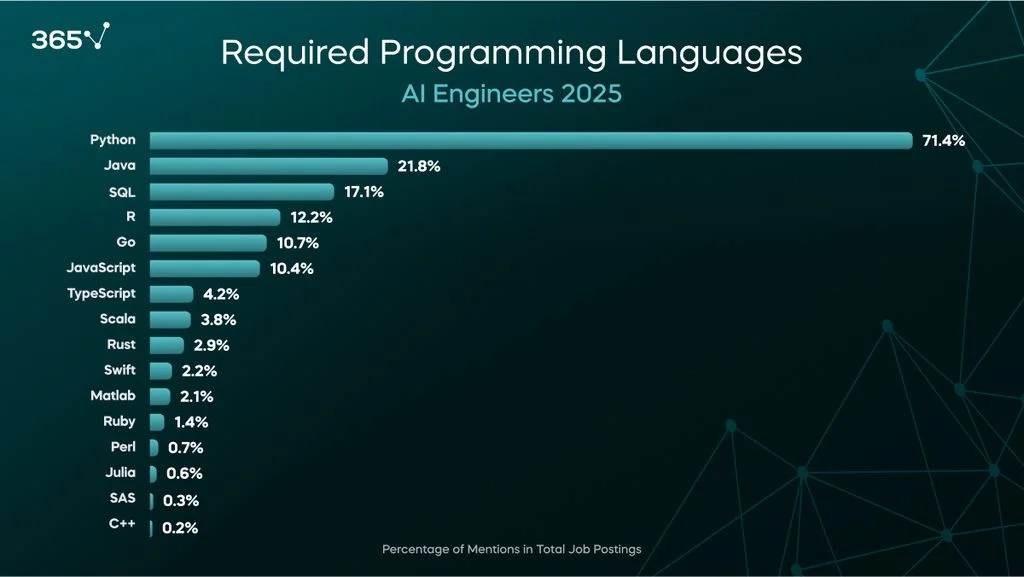
Python—mentioned in 71% of postings—is the most important language on the AI engineering job market because it's easy to learn, has a huge ecosystem of libraries like TensorFlow, PyTorch, and scikit-learn, and is widely supported in both research and industry. Its readability and flexibility make it ideal for everything from data preprocessing to model deployment.
This is true across most data-related roles, as Python consistently ranks as the most popular language for data scientists and ML engineers in our research.
In other words: Python should be your foundation, so make sure you know it well.
Unlike the other roles we researched, however, Java holds steady in the AI engineer job outlook at 22% (compare this with the 13% seen for data scientists in 2025).
Java is common in AI engineer roles because they often deploy models into enterprise systems where Java is already used. Data scientists and ML engineers, on the other hand, mostly focus on prototyping and modeling in Python.
SQL was our top skill across roles in 2024, and our research into data scientists and analysts in 2025 shows that that importance is only growing.
In our AI engineer research, SQL was mention in 17% of postings. While not as prominent as Python, SQL is important for AI engineers who need to query data and work with databases.
R is less prevalent in AI engineering roles. While the language appears in 12% of job postings, it's primarily used by statisticians and data scientists for exploratory data analysis and statistical modeling.
Is mastering Python your next learning goal? Check out our Python Programmer Bootcamp. This course is taught by popular YouTuber Giles McMullen-Klein—one of the most engaging instructors out there.
AI Skills
Along with programming, the most important skills for AI engineers are—you guessed it—AI skills. Here’s what the AI engineer job outlook for 2025 says: 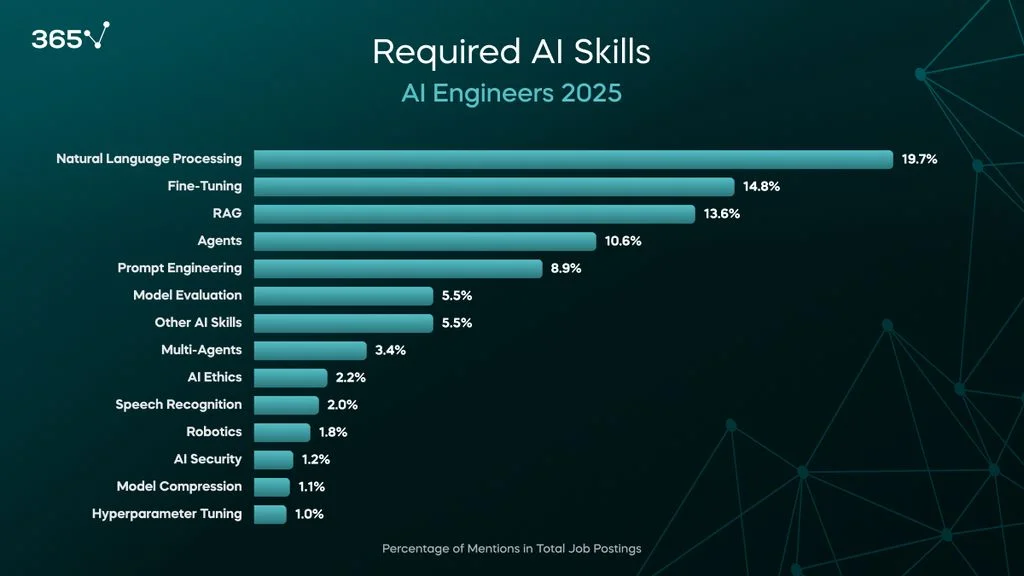
AI skills encompass a broad range of topics, from highly technical to social aspects. While it's challenging to capture every facet of AI in a single graph, here are some of the most frequently mentioned AI specializations from our research.
Language & Communication
These skills dominate the AI engineer job market, focusing on how AI systems process and generate human language:
- Natural Language Processing (NLP) - 19.7%: Most requested skill, central to AI applications from chatbots to summarization tools
- Prompt Engineering - 8.9%: As large language models become mainstream, structuring effective prompts is becoming critical
- Speech Recognition - 2.0%: Important for voice interfaces, transcription tools, and accessibility technologies
Model Development
Technical skills for training and optimizing AI models:
- Fine-tuning - 14.8%: Used for adapting general-purpose models to specific tasks or domains
- Model Evaluation - 5.5%: Fundamental for improving and validating models
- Model Compression - 1.1%: Specialized skill for deploying models on edge devices or optimizing for latency
- Hyperparameter Tuning - 1.0%: Less common due to increased automation tools like AutoML
Advanced AI Systems
- RAG (Retrieval-Augmented Generation) - 13.6%: A growing method for combining language models with external knowledge sources, especially valuable in enterprise applications
- AI Agents - 10.6%: Systems that make autonomous decisions or execute tasks, such as AI assistants or reasoning tools
- Multi-Agent Systems - 3.4%: Advanced concept involving networks of agents that interact, used in simulations and planning
Responsible AI
- AI Ethics - 2.2%: Increasingly important but still underrepresented in the AI engineering job market
- AI Safety & Security - 1.2%: Includes adversarial robustness, secure deployment, and model misuse prevention
Interested in any of these skills? Our platform offers comprehensive courses across the AI spectrum. For those drawn to language-focused AI, explore our in-depth NLP, LLMs, and Speech Recognition courses. If you're keen to learn about responsible AI development, our AI ethics course provides essential knowledge and best practices.
AI Tools
To put these skills into practice, you'll need to get familiar with specific AI tools. Ever since the generative AI boom in 2022, this means working with various foundation models.
Foundation models are large, pre-trained AI models that can be adapted to a wide range of task—like generating text, analyzing images, or converting speech to text.
AI engineers use them because they’re efficient, flexible, and ready for real-world applications without needing to be built from scratch.
Here are the most in-demand foundation models in the AI engineer job market for 2025.
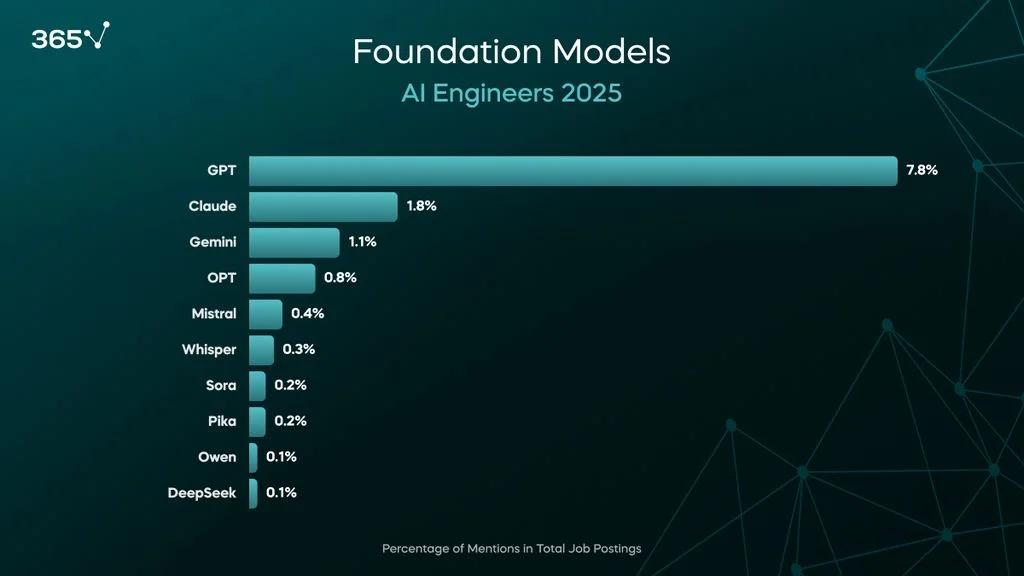
GPT leads by a wide margin, appearing in 7.8% of AI engineer job postings. ChatGPT has been the go-to model for a variety of language tasks—like chatbots, summarization, and code generation—since it’s release in 2022.
Other models gaining traction include:
- Claude (Anthropic) – 1.8%: Known for its focus on safety and conversational reasoning
- Gemini (Google) – 1.1%: Built for multimodal tasks (combining text, images, and more)
- Whisper (OpenAI) – 0.3%: Used for speech-to-text and transcription applications
Along with foundation models, you'll need experience with specialized AI tools that support the specific skills mentioned above.
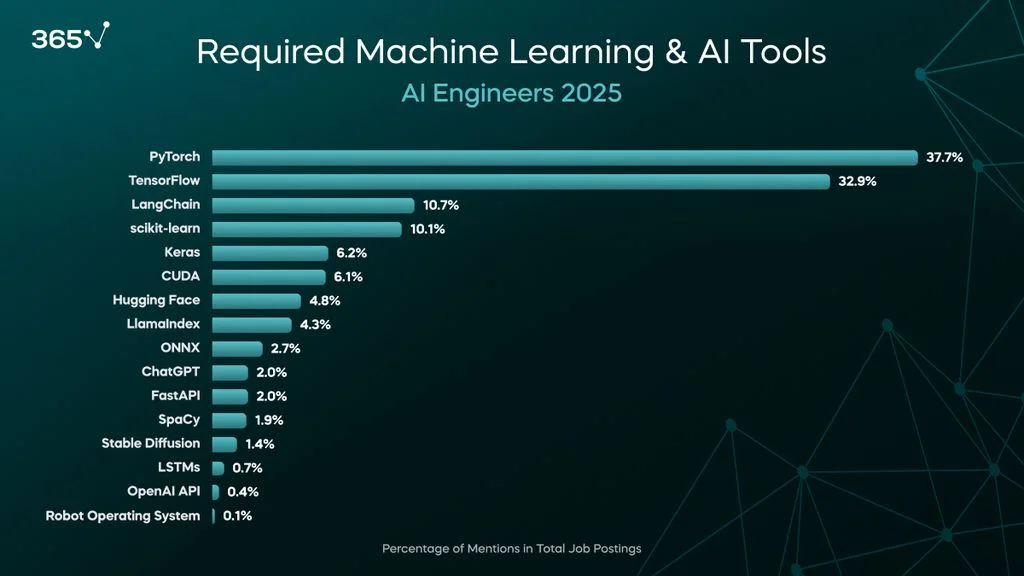
|
Skill Category |
Example Skills |
Related Tools |
|
NLP & Language Tasks |
NLP, Prompting, RAG |
LangChain, Hugging Face, spaCy, LlamaIndex |
|
Model Training & Tuning |
Fine-tuning, Evaluation, Compression |
PyTorch, TensorFlow, Keras, CUDA, scikit-learn |
|
Deployment & Integration |
Agents, APIs, System-building |
FastAPI, ONNX, OpenAI API, ChatGPT |
|
Specialty Applications |
Speech, Robotics, Creative AI |
Whisper, Stable Diffusion, ROS |
The table above shows how specific tools align with each AI skill category we discussed above, making it easier to see which tools you'll need for different specializations.
The most in-demand tools for AI job opportunities are those associated with model training and tuning. This reflects the industry's need to customize pre-trained models for specific business applications.
- PyTorch (37.7%) and TensorFlow (32.9%): The backbone for building and fine-tuning custom deep learning models
- Keras (6.2%): For fast prototyping and training models with TensorFlow
- scikit-learn (10.1%): Often for feature engineering, evaluation pipelines, or non-deep learning models
- CUDA (6.1%): For training large models efficiently on GPUs
Tools for language-related tasks are also in high demand. Let’s break down them down:
- LangChain (10.7%) and LlamaIndex (4.3%): Popular tools for creating custom chatbots and smart search systems that can access and use specific information
- Hugging Face (4.8%): A platform that provides ready-to-use language models—a toolbox for text processing tasks
Want to learn these tools quickly? 365 Data Science’s courses cover ChatGPT, Python frameworks like TensorFlow, modern tools like LangChain, plus so much more. Start learning today!
Machine Learning & MLOps for AI Engineers
Although AI engineers work with cutting-edge models and tools, their work is grounded in a solid machine learning foundation. These skills enable them to understand, build, and optimize intelligent systems that work in the real world.
Machine Learning Skills
Let’s see what machine learning skills are dominating the AI engineer job outlook for 2025.
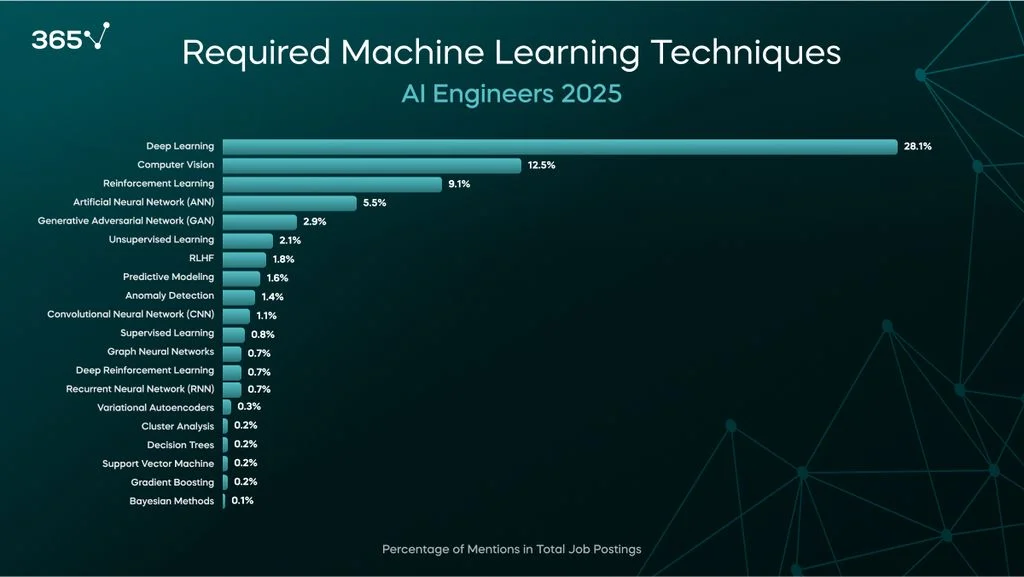
Deep Learning was mentioned in 28.1% of postings. This is the core foundation of modern AI, behind innovations from chatbots to image recognition and speech processing—making it an essential skill for jobs in artificial intelligence.
Computer Vision (12.5%) allows us to make applications like facial recognition, object detection, and autonomous systems.
Reinforcement Learning (9.1%) is used in areas like recommendation systems, robotics, and game-playing agents.
Artificial Neural Networks (ANN) (5.5%) are the base concept behind deep learning. Employers expect AI engineers to understand the structure and function of neural nets.
Generative Adversarial Networks (GANs) (2.9%) are behind creative AI tasks like image generation and editing.
As the most sought-after ML skill for AI engineers, you can't get into this role without mastering deep learning. Luckily, we have all the courses to get you started! Explore our deep learning courses and get job-ready today!
Now that we’ve looked at the basic ML skills appearing in the AI engineer job market for 2025, let’s get into MLOps.
MLOps & Deployment Tools
MLOps, or Machine Learning Operations, is basically how we get AI models from the lab into the real world. It's all the tools and practices we use to deploy and manage these models—like DevOps, but specifically for machine learning.
Here are some of the essential MLOps tools for AI engineers:
|
Category |
Key Tools |
What They're Used For |
|
Deployment |
Docker, Kubernetes |
Packaging and running models across different environments. |
|
Automation |
CI/CD tools (e.g., GitHub Actions) |
Automating model updates, testing, and deployment. |
|
Model Serving |
SageMaker, Kubeflow, ONNX Runtime |
Hosting models as APIs or services for real-time use. |
|
Experiment Tracking |
MLflow, DVC |
Tracking experiments, model versions, and data lineage. |
|
Monitoring |
Model Monitoring, Prometheus |
Watching for data drift or drops in model performance after launch. |
|
Cloud Platforms |
Vertex AI, Azure DevOps |
Scalable, cloud-native ML development and deployment. |
Let's look at how these tools feature in the AI engineer job market for 2025.
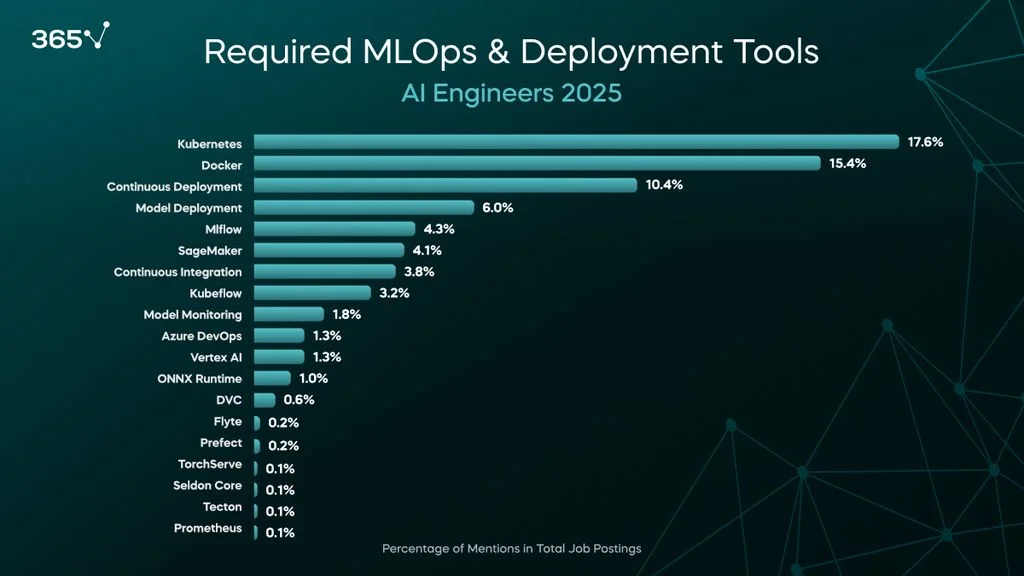
Kubernetes (17.6%) is the most in-demand MLOps tool—it helps manage and scale model deployments in production environments.
Docker (15.4%) highlights how critical containerization has become for building portable and consistent ML applications.
Continuous Deployment (CD) (10.4%) emphasizes that automated, frequent model updates are now standard practice in ML workflows.
Ready to master data warehousing and MLOps? Our upcoming Data Warehousing course teaches you everything you need to know about storing and managing large-scale data. Sign up for free to access the course the moment it’s released!
Speaking of data warehousing, let's examine cloud skills in the AI engineer job outlook for 2025.
Cloud Skills for AI Engineers
These skills have been consistently growing in our yearly job market research, showing their increasing importance in data and AI-related roles.
More and more companies are shifting their machine learning workloads from local servers to cloud infrastructure, where compute power, storage, and deployment tools are more flexible and cost-effective.
AI engineers need to be able to use these tools for all aspects of their work. Let’s see what cloud skills employers are seeking in the 2025 AI engineer job market.
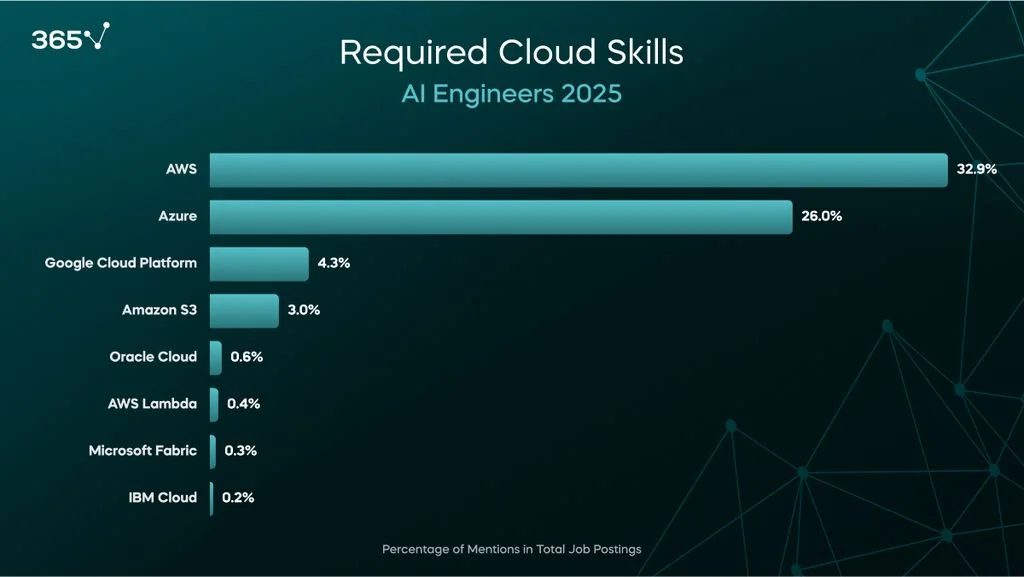
As you might expect if you have worked in the cloud before, Amazon Web Services (AWS) and Microsoft Azure lead the pack by a strong margin.
Azure—mentioned in 33% of AI engineer job postings—is popular in companies working in an enterprise setting with Microsoft integration. It connects smoothly with Microsoft tools like Office and Active Directory, while offering both responsible AI features and the flexibility to run AI in the cloud or on local servers.
AWS—found in 26% of postings—is popular for its flexibility, scalability, and broad support for open-source ML tools. It's ideal for training large models, managing massive datasets, and building globally distributed AI systems through the SageMaker ecosystem.
One notable trend across our job market research is the rising dominance of AWS cloud systems, which have now overtaken Azure—previously the leading cloud tool in 2024.
Looking to start your cloud journey? Our new course is the perfect introduction. Led by cloud technology expert Andrew Jones, you'll learn all the necessary foundations before choosing a specific tool for your toolkit. Start learning today!
Interdisciplinary Technical Skills
Looking back to job specialization, our analysis reveals that around a quarter of AI engineer job postings seek versatile professionals.
AI engineer job postings may include data engineering skills because high-quality, well-managed data is the foundation of any successful AI system.
Data Engineering Skills for AI Engineers
Let’s take a closer look at how this appears in the 2025 AI engineer job outlook.
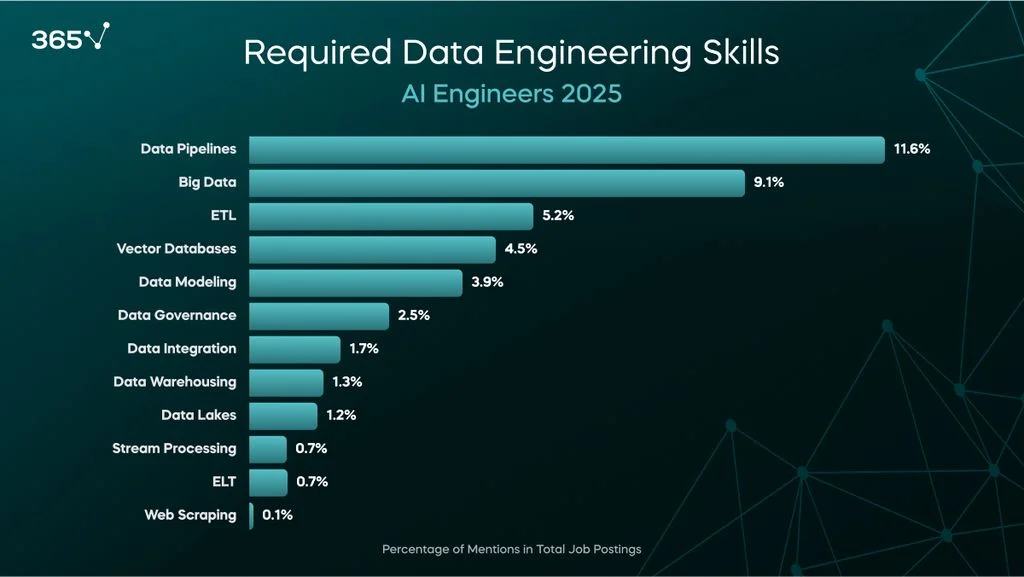
Data pipelines (11.6%) top the list, which makes perfect sense. AI engineers are often responsible for feeding models with clean, structured, and up-to-date data.
Big data (9.1%) is also a major focus, reflecting the reality that AI models—especially those involving deep learning or LLMs—require large-scale, distributed data processing.
ETL (5.2%) and data modeling (3.9%) show that AI engineers are also involved in preparing and structuring data for analysis and modeling.
Vector databases’ presence (4.5%) is also notable—reflecting the growing demand for AI engineers building RAG systems or search/recommendation engines, where vector storage and similarity search are core components.
Don't have these skills in your toolkit yet? Don't worry! We've got courses covering all of these skills: Building Data Pipelines, Data Architecture, and Intro to Vector Databases. Master these skills and stand out in the 2025 AI engineer job market.
Data Engineering Tools for AI Engineers
Going along with these skills, there are a number of data engineering tools you should add to your toolkit as an AI engineer in 2025.
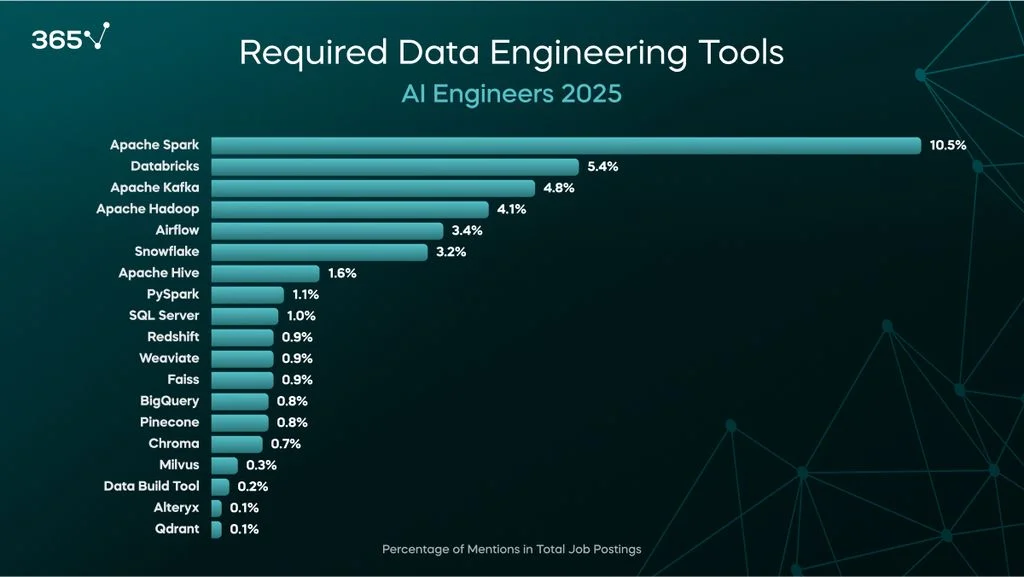
- Apache Spark (10.5%): As the most widely required tool, Apache Spark enables processing of large datasets for AI model training through its distributed computing capabilities
- Databricks (5.4%): Gaining popularity thanks to its unified platform that combines Spark integration, data workflows, and ML development in the cloud
- Apache Kafka (4.8%): AI engineers use Kafka to process real-time data streams for applications like fraud detection, personalization, and sensor data analysis
- Apache Hadoop (4.1%) and Airflow (3.4%): There is high demand for batch processing tools, with Airflow being especially valued for automation of ETL and model retraining workflows
- Snowflake (3.2%): This reflects the growing interest in cloud-based data warehousing that supports AI/ML workflows, especially in enterprise settings
How Can You Land an AI Engineer Job?
The next section of our AI engineer job outlook research looks at two important aspects of our job postings: locations and salaries
Where Do AI Engineers Work?
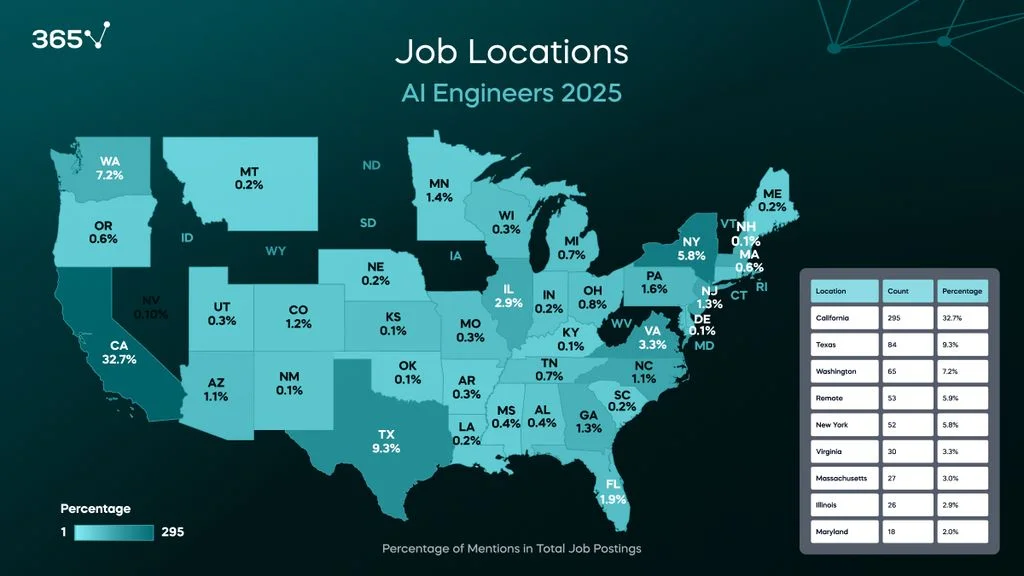
When you think about the home of AI innovation, you likely think of one place: Silicon Valley.
According to our research, this assumption still holds true in 2025. There is a strong dominance of AI engineering roles in California compared to any other US state.
While this might seem unsurprising, it actually shows an interesting contrast with other data-related roles. Our 2025 job market research found that for data scientists and analysts, New York has—for the first time—surpassed California as the leading location for jobs.
This is not yet the case for artificial intelligence careers.
California is still ahead—taking nearly 33% of all the job postings—likely because it’s home to many of the biggest tech companies and AI startups, along with strong research hubs and steady funding.
For now, it remains the center of AI development—especially in areas like foundation models and deployment tools. Although, major AI hubs are emerging worldwide, particularly in China where new models like DeepSeek have disrupted the market.
While Texas, Washington, New York, Virginia, Massachusetts, Illinois, and Maryland also rank in the top 10 locations for AI roles, each of these states appears in less than 10% of job postings.
Now, let's address the question that’s on everyone’s mind.
Remote Work for AI Engineers
Only 5.9% of the AI engineer job postings we examined offered fully remote positions.
This parallels our findings for data scientists in 2025, which offered only 5.1% remote positions.
Though this may seem like a small percentage, there's more to the story.
Hybrid work is becoming the standard: in 2024, half of US workers split their time between office and home, according to Statista.
Since 2020, most companies have moved away from strict in-office requirements. But many are partially returning to an office set-up, recognizing that a mix of remote and office time works best for many teams.
If you’re looking to enter the AI engineer job market in 2025, keep in mind that—for most positions—you might need to consider relocating.
How Much Do AI Engineers Make in 2025?
Looking at real salary data from Glassdoor in early 2025, the average AI engineer salary in the US is around \$206K on average. Of course, what you actually make depends a lot on your experience—let’s break it down:
0-1 Year: \$143,000
2-3 Years: \$172,000
4-6 Years: \$199,000
7-9 Years: \$231,000
10+ Years: \$269,000+
Looking at last year's numbers, when AI engineers took home around \$155,000 on average, we're seeing salaries jump by more than \$50,000. This boost in pay shows just how desperately companies are hunting for talented AI professionals.
Our market research shows similar results.
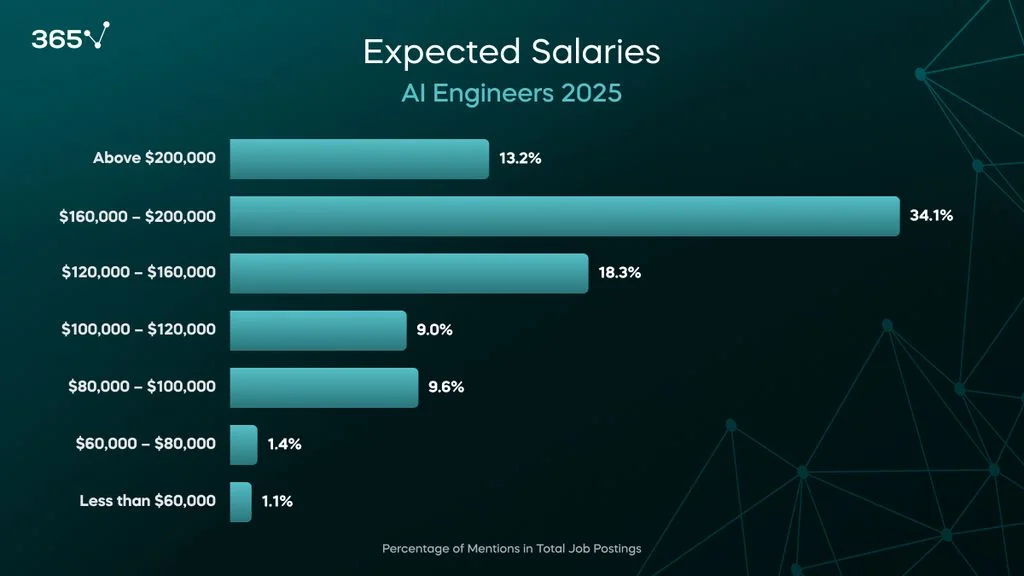
The most frequently cited salaries were between \$160,000 and \$200,000 at 34% of postings. This is followed by \$120,000 to \$160,000 (18%) and above \$200,000 (13%).
Notably, only 14% of postings didn't specify a salary—indicating that most companies are now openly sharing compensation details.
As we mentioned above, the pay you can expect depends a lot on your experience. On this topic, let’s look at what level of experience employers are expecting in the 2025 AI engineer job market.
Required Experience for AI Engineers
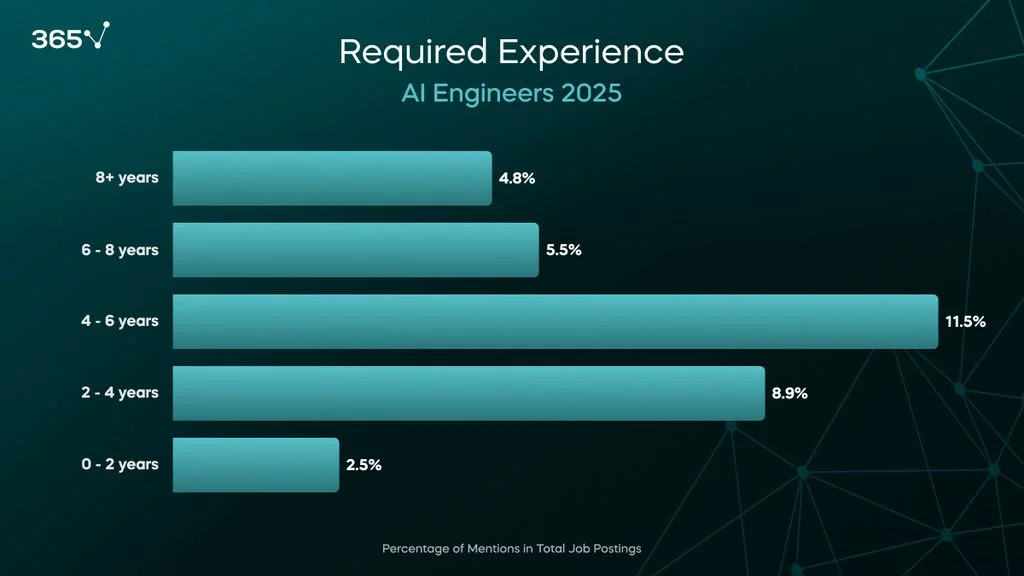
In 2025, most AI engineering roles are aimed at professionals with 2–6 years of experience, with 4–6 years being the most common requirement at around 12% of postings.
There’s steady demand for senior talent as well, but entry-level positions are rare—only 2.5% of postings target candidates with 0–2 years of experience.
This suggests that artificial intelligence career paths are typically not a starting point in tech, but a step up for those with prior experience in software, data, or machine learning roles.
It's important to note, however, that only 33% of job postings mention specific experience requirements. This suggests that around two thirds of employers might be more focused on your proven skills and portfolio rather than years of experience.
What is the Data Analyst Job Outlook in 2025?
Is AI engineering a good career in 2025? The data strongly suggests yes!
The AI engineer job outlook for 2025 shows incredible promise. Here are the key trends we've discovered:
- Salaries have shot up to \$206,000 on average—that's \$50K more than last year
- California still dominates the scene with 33% of AI jobs, though other tech hubs are emerging
- Cloud expertise is crucial, with Azure (33%) and AWS (26%) leading the pack
- Core AI/ML skills are essential, with most roles requiring expertise in popular frameworks, deep learning, and model deployment
The field is getting more exciting as companies push the boundaries with foundation models and tackle real-world deployment challenges.
Are you looking to become a specialized AI engineer or looking to combine AI with other technical skills? The opportunities are there.
You might need to consider moving to a tech hub, but with salaries climbing and problems getting more interesting, it could be worth the leap.
Just make sure you're ready to keep learning—this field moves fast, and next year's must-have skills might look different from today's.
Become an AI Engineer with 365 Data Science
At 365 Data Science, we offer a comprehensive AI Engineer Career Track to transform beginners into job-ready AI professionals. Our carefully structured curriculum covers all the essential skills highlighted in this AI engineer job outlook report—from Python programming and AI fundamentals to practical LLM engineering and vector databases.
We design our curriculum to meet the evolving AI engineer requirements, ensuring our courses prepare you for the increasingly technical demands of the role.
The Career Track includes practical projects that simulate real-world AI applications, like building chat applications with OpenAI and working with speech recognition. Plus, our courses are regularly updated to reflect the latest industry trends in AI development.
Ready to start your journey toward a rewarding career in AI engineering? Sign up today and join thousands of students who are preparing for the AI revolution. Your future in AI engineering starts here!
We hope this AI engineer job outlook has helped you understand what skills you need to develop to land your dream role in 2025!
FAQs

![Machine Learning Engineer Job Outlook 2025 [Research on 1,000 Job Postings]](https://365datascience.com/resources/blog/thumb@360_bdofm84px2p-the-ml-engineer-job-market-in-2025-thumb.webp)
![Data Scientist Job Outlook 2025 [Research on 1,000 Job Postings]](https://365datascience.com/resources/blog/thumb@360_9i9eyv5957g-data-scientist-job-market-research-2025.webp)
![The Most In-Demand Machine Learning Engineer Skills in 2024 [Research on 1,000 Job Postings]](https://365datascience.com/resources/blog/thumb@360_rtwxu4h3tr-1000-ml-engineer-job-postings-analysis-from-indeed-usa-thumb.webp)

